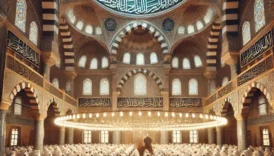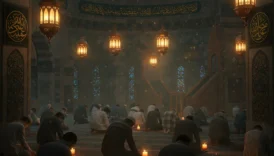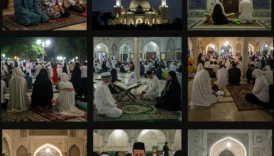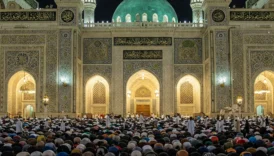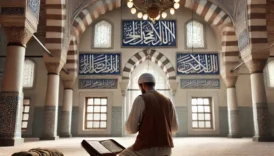Grave Life and Barzakh Realm
Within the scope of belief in the Hereafter, one of the most frequently asked questions concerns the grave (qabr) and the Barzakh realm. What awaits a person who has taken their final breath on Earth? What blessings are promised to believers, and what hardships might sinners face? These issues will be explored in this text.
- Grave Life and Barzakh Realm
- Definition of the Grave and Barzakh
- Importance of the Grave and Barzakh
- The Quran on Grave Life
- Hadith References to the Grave and Barzakh
- What Happens in the Grave?
- The Effects of Deeds in the Grave
- The Wisdom Behind the Barzakh Phase
- The Questioning in the Grave
- Mercy for the Believer, Torment for the Sinner
- The Impact of Prayers and Good Deeds on the Grave
- A Short Example of Supplication
- Final Word
- References
Definition of the Grave and Barzakh
The grave (qabr) is the first station where a person stays after death. Linguistically, the term “Barzakh” means a “veil” or “barrier” between two realms. In Islamic theology, Barzakh refers to the transitional phase between worldly life and the Hereafter. In this realm, a person experiences a form of waiting and adaptation determined by the deeds they performed in the world. For believers, the grave may become one of the gardens of Paradise. For those who are sinful or deny the truth, it can be a place of torment and fear. The life of the grave is the first reflection of the test of worldly life.
Importance of the Grave and Barzakh
Belief in the Hereafter does not merely encompass the events of the Day of Judgment and beyond; it also includes what happens from the moment of death. After death, every soul undergoes a period of waiting in the grave and in the Barzakh realm until the Day of Gathering (Mahshar) arrives. This waiting period manifests differently for each person, depending on their faith and actions in this life. While the righteous may find peace and blessings, those burdened with sins may suffer regret and punishment.
The Quran on Grave Life
Although the Quran does not explicitly mention the grave and Barzakh by name, many verses indicate that there is a barrier between the living and the dead, highlighting the transition after death. One verse that underscores this truth is:
حَتّىٰ إِذَا جَاءَ أَحَدَهُمُ الْمَوْتُ قَالَ رَبِّ ارْجِعُونِ\nلَعَلِّي أَعْمَلُ صَالِحًا فِيمَا تَرَكْتُۚ كَلَّاۚ إِنَّهَا كَلِمَةٌ هُوَ قَائِلُهَاۚ وَمِنْ وَرَائِهِمْ بَرْزَخٌ إِلَىٰ يَوْمِ يُبْعَثُونَ
Until, when death comes to one of them, he says, ‘My Lord, send me back that I might do righteousness in that which I left behind.’ No! It is only a word he is saying; and behind them is a Barzakh until the Day they are resurrected.” (Quran 23:99-100)
This passage illustrates that at the moment of death, one realizes the reality of the Hereafter, but it is too late to return to the world and perform good deeds. The verse also mentions a Barzakh, a realm in which the soul resides until Resurrection. Death thus signifies a transition into a new dimension, one that lies between worldly life and the final judgment.
Hadith References to the Grave and Barzakh
Prophet Muhammad (peace be upon him) frequently stressed the importance of the life of the grave. In one hadith, he said: “The grave is the first stage among the stages of the Hereafter.” (Tirmidhi, Zuhd, 5). This statement indicates that one’s condition in the grave offers an initial glimpse into how they will fare in the eternal abode.
In another hadith, the Prophet states, “When a person dies, all their deeds cease except for three: ongoing charity (sadaqah jariyah), knowledge that benefits others, and a righteous child who prays for them.” (Muslim, Wasiyyah, 14). Although one can no longer carry out new deeds after death, the positive traces left behind—such as charitable work, beneficial knowledge, and righteous offspring—can continue to benefit a person in the grave.
What Happens in the Grave?
Life in the grave largely depends on one’s faith and actions in this world. For a person who has believed and performed righteous deeds, the grave can be a place of peace and mercy. They may sense the fragrance of Paradise and remain engaged in the remembrance of God, anticipating the blessings to come. For those steeped in sin or disbelief, however, the grave can be a place of torment and fear. One’s deeds, good or bad, accompany them in the grave, becoming either a friend or an enemy.
A hadith describes this reality by stating: “The grave is either one of the gardens of Paradise or one of the pits of Hell.” (Tirmidhi, Qiyamah, 26). This declaration shows that the grave is not a neutral zone; rather, it reflects one’s performance in the test of worldly life.
The Effects of Deeds in the Grave
The deeds one performs throughout their life—prayer, fasting, charity, honoring parents, and respecting others’ rights—may illuminate and ease a person’s time in the grave. Conversely, acts of oppression, injustice, unlawful earnings, and neglect of religious obligations can signal troubles to come in this intermediate realm.
Various narrations highlight how certain deeds continue to aid a person even after death. For example, the recitation of the Quran and ongoing acts of charity can serve as a source of spiritual support in the grave, emphasizing the importance of living a life oriented toward the afterlife.
The Wisdom Behind the Barzakh Phase
The Barzakh phase allows a person a sort of preliminary insight into the final outcome awaiting them. Separated from the physical capabilities of this world, the soul experiences its deeds more directly. Although the ultimate reckoning occurs on the Day of Judgment, an initial taste of either punishment or blessings is presented in the grave and Barzakh. This also facilitates a period of reflection on the soul’s part, anticipating the Great Gathering and final account.
For a believer, the Barzakh can be a prelude to communion with God, free from worldly distractions. In a sense, it becomes the beginning of the journey toward Paradise.
The Questioning in the Grave
A well-known aspect of grave life is the questioning by the angels Munkar and Nakir. They ask fundamental questions like, “Who is your Lord? Who is your Prophet? What is your Book?” These questions test the sincerity and depth of one’s faith in life. Believers will find it straightforward to answer, while those lacking true faith may fall into confusion and despair.
A supplication that can be made for ease in this questioning is:
اَللّٰهُمَّ إِنِّي أَسْأَلُكَ الثَّبَاتَ فِي الْقَبْرِ وَالْأَمَانَ يَوْمَ الْحِسَابِ
Allāhumma innī as’aluka al-thabāta fī al-qabr wa al-amāna yawma al-ḥisāb
Meaning: “O Allah, I ask You for steadfastness in the grave and safety on the Day of Reckoning.”
Mercy for the Believer, Torment for the Sinner
Just as faith and righteous deeds bring peace to a believer’s heart in this world, they also open the doors of mercy in the grave. According to various narrations, the grave expands, and the person may even smell the fragrance of Paradise. This tranquility is a reward for a heart sincerely devoted to God.
However, those who persist in wrongdoing or disbelief may experience an oppressive loneliness, darkness, and fear in the grave. Unable to escape the consequences of their actions, they feel the burden of their sins even before the final judgment. Remorse and regret become palpable in this realm for those who did not repent.
The Impact of Prayers and Good Deeds on the Grave
For the person who departs from this world, the greatest forms of assistance are the good deeds they leave behind and the supplications offered by loved ones. Prophet Muhammad (peace be upon him) taught that a righteous child’s prayers can continue to benefit the deceased. Hence, leaving behind a legacy of charity, teaching beneficial knowledge, or raising righteous offspring can ease the conditions of the grave.
Prayers offered by fellow believers—whether through funeral prayers or personal supplications—also hold great importance. Cultivating friendships in this life that are based on godly love can have a positive spiritual impact in the next life. Indeed, every good deed performed in this life provides a lamp that can light one’s way in the grave.
A Short Example of Supplication
The Prophet (peace be upon him) taught a well-known supplication to seek protection from various trials, including the punishment of the grave:
اللّٰهُمَّ إِنِّي أَعُوذُ بِكَ مِنْ عَذَابِ الْقَبْرِ، وَمِنْ عَذَابِ جَهَنَّمَ، وَمِنْ فِتْنَةِ الْمَحْيَا وَالْمَمَاتِ، وَمِنْ فِتْنَةِ الْمَسِيحِ الدَّجَّالِ
Allāhumma innī a‘ūdhu bika min ‘adhāb al-qabr, wa min ‘adhāb jahannam, wa min fitnat al-maḥyā wa al-mamāt, wa min fitnat al-masīḥ al-dajjāl
Meaning: “O Allah, I seek refuge in You from the torment of the grave, from the torment of Hell, from the trials of life and death, and from the trial of the False Messiah (Dajjal).”
Final Word
The grave life and the Barzakh realm act as a transitional period, reflecting the first consequences of worldly deeds. It can be a station of ease or hardship, depending on the strength of one’s faith and the righteousness of their actions. For the believer, the grave becomes a place of hope and comfort; for the sinner or denier, it becomes the start of lasting regret and anxiety. The condition of the Barzakh realm serves as a preview of the final outcome awaiting every soul on the Day of Judgment.
Nevertheless, it is crucial to remember that Allah’s mercy is vast, and the door of repentance (tawbah) remains open until one’s final breath. Preparing for the Barzakh involves purification of the heart, living in harmony with others, and accumulating good deeds. Each act of worship and kindness performed in this world becomes a lamp that illumines the grave.
References
- Bukhari, Al-Jami’ al-Sahih
- Muslim, Al-Sahih
- Tirmidhi, Al-Jami’ as-Sunan
- Ibn Majah, Al-Sunan
- Tabari, Jami’ al-Bayan
- Ibn Kathir, Tafsir al-Qur’an al-Azim
- Imam al-Ghazali, Ihya Ulum ad-Din
- Al-Malili Hamdi Yazir, Hak Dini Kur’an Dili

